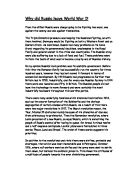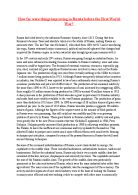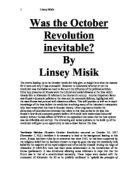The living standards of the workers and peasants under this regime certainly provided cause for complaint: By 1914, around 80% of the population lived in small villages leading lives that were not dissimilar to the British peasants during the Middle Ages. Having been recently freed from slavery, these peasants lived in the utmost poverty owning small patches of land, (usually unworkable during the winter due to frost) and large debts. They were, for the most part illiterate which made it hard, if not impossible, for them to modernise their techniques. There was a rising discontent among these peasants, they began to long for a reform of the system as their love of the land was marred by stories of the relatively wealthy peasants of Western Europe. Russia’s alliance with France in ?????? brought a sudden industrialisation preparing this huge country for the possibility of war. Huge industries and cheaply erected accommodation were built up almost over night as the Tsar anticipated the vast influx of workers into the cities.
By the turn of the century, almost 20% of the population consisted of factory workers. Having migrated to the city under illusions of what the future would bring them, they laboured all day, every day, for horrifically low wages and little to no rights. Their situation worsened as the likelihood of war increased: Wages were reduced, bonuses and allowances were gradually taken away, hours of work were extended and a system of fines and battering of workers became normal. Russian industrial workers were thus submitted to the harshest of conditions which, not surprisingly, provoked discontent and attempted revolts. These workers were in fact particularly vulnerable to unrest as Russia was new to industrialisation and was dealing with her first generation having to endure factory discipline. This situation increased the feeling of anger and, in some cases, hatred towards the man who was putting them through this life of misery, the Tsar. This in turn heightened support amongst workers for the rising opposition parties. With the deteriorating economic and social situation in Russia all workers, middle classes, aristocrats and even some of the Tsars most die-hard supporters were starting to feel real resentment and empathy for the system the were under. The Tsar had launched an attempt to catch up with the west by improving the country’s industry. He seemed indifferent however to the pressing need to restructure the political system, something which many would say goes hand in hand with the development of industry when striving for westernisation.
By 1900 therefore, Russia was not only behind in industry and agriculture compared to her allies, but also in her autocratic political system. Britain and France had both had their revolutions, having made the transition from absolutism to democracy over 100 years earlier. Russia, however, had yet to undergo this transition which many believed was essential for one’s development. A second revolution seemed to be sweeping through Europe, not quite finding a country to settle in, a revolution based on an ideology, that of collectivism. Many determined revolutionists had arisen as a result of Europe’s industrialisation which seemed to have been accompanied by the establishment of a new system based on exploitation and wealth, a system which came to be called capitalism. Socialist parties became popular in Europe and then in Russia. The Marxist ideology, based on the principle of total equality and aiming for the abolition of hierarchy within a society, seemed to have a strong hold in Russia where exploitation and inequality were taken to a new extreme. With the rising mistrust of the Tsar, support for these revolutionaries soared as people began to predict a collapse of the archaic regime, or at least a reformation.







